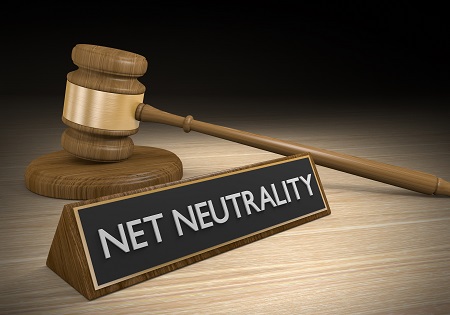The FCC’s recent rule change overturning Net Neutrality regulations has gotten a lot of press recently. Net Neutrality regulations mandated that your internet service provider (ISP) not prioritize one specific type of content over another. Of course, you might choose to prioritize specific types of content on your own – for instance, your business likely prioritizes phone data over other data if your phones share a data connection with your office computers. Net Neutrality doesn’t prevent this – it prevents your ISP from choosing to slow down specific types of data on their own, without you making that decision.
People are extremely divided on what will happen without Net Neutrality in place. Some believe that ISPs will prioritize their own services. In the case of AT&T, this would mean that streaming video to your PC from DirectTVs site would be very fast, while streaming from competitor Dish Network would be slower (or even blocked, requiring you to pay extra to access that website).
Another negative possibility: In the case of cell phones, companies like Netflix could pay Verizon to deliver better video quality to their users. Verizon’s users would see Netflix’s product as superior, when in fact Verizon was being paid to intentionally make competing products look worse, to deliver more customers to Netflix.
Still others think that it won’t have any major impact – yet. Nelson Grandos at Forbes points out that there are still laws on the books preventing anti-competitive behavior, meaning competitor services are unlikely to be blacked out entirely even without Net Neutrality on the books. Even Grandos, however, admits that if Congress doesn’t address the issue at some point, there could easily be big fights between providers that end badly for their customers (that’s all of us).
What does this mean for your business?
Net Neutrality repeal is not likely to have much short-term impact, because the issue is so controversial that ISPs are unlikely to make any major, sudden moves to prioritize content. In the long term, it may become important to understand exactly what you’re buying when you sign a long-term contract with your internet provider – does the contract allow them to effectively slow down a service you rely on in order to prioritize another one? If so, you might notice your Dropbox speeds fall after Box.com delivers a big check to them, “purchasing bandwidth” to “prioritize their customers’ connections.” This would not be a pleasant thing to have happen to your business halfway through a service contract.
While this isn’t happening quite yet, it’s a good example of why you should involve your technical team (and your Managed Service Provider, if you have one) in discussions on which provider to select and what service quality to purchase. You’ll want to go through any ISP agreement and/or terms of service with a fine-tooth comb. Unfavorable data prioritization is one more item of importance to land on a stack of important considerations when selecting an ISP, including bandwidth needs, uptime guarantees and backup service during outages. Always remember than Managed Service Providers are here to help with tough decisions like these!
To learn how WingSwept’s Managed Service offering can help your company manage technology vendor agreements, call us at 919.779.0954 or email us at Team_WingSwept@WingSwept.com.

